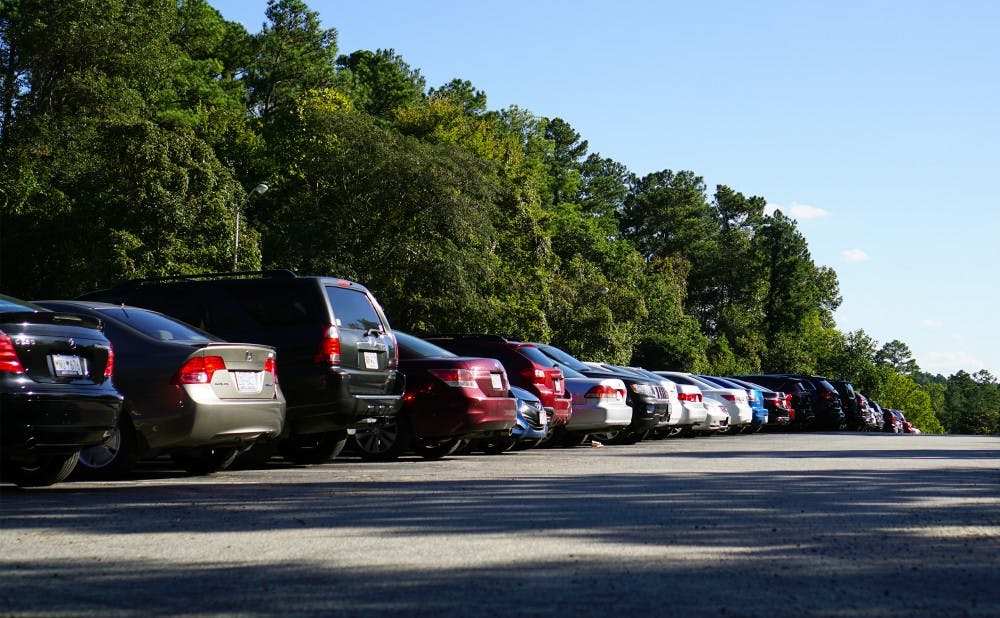Duke students’ frustrations with campus parking are not going away, although some of their cars might be.
Towing, ticketing and a lack of available on-campus parking spots have presented problems for both commuters and non-commuters this year, as in years past. Some students said they do not see the point of purchasing a Blue Zone parking pass due to the scarcity of open parking spots.
“I just think it is absurd, inappropriate and negligent that at a campus like this, there is only one parking lot that is within reasonable distance from campus,” senior Rachel Stand said.
Senior Amanda Ager, who is living off campus this year, said she has no problem with the distance to Blue Zone but is frustrated with the “ridiculous price” she paid for the Blue Zone commuter pass, which does not guarantee an open spot in the lot.
Vice President for Administration Kyle Cavanaugh explained that construction projects across campus have resulted in the loss of several hundred spaces in the Blue Zone parking lot area of campus. The University attempted to alleviate this loss by creating additional capacity in the lower lot of the Blue Zone. However, he said that the creation of the new parking garage on Science Drive, scheduled to open in January 2017, will address these problems.
“The Blue Zone will return to solely an undergraduate area,” he said. “I think it will alleviate a lot of pressure.”
Cavanaugh explained that students will be able to park in the new garage along with faculty and staff members. There will be approximately 2,400 spots in the new structure.
Senior Nathaniel Sizemore said he hoped the new lot will “alleviate a lot of congestion on the roads and provide a back-up space if the Bryan Center is closed.”
For now, some students have resorted to creating their own unofficial spots when the lots fill up. However, doing so can not only be a safety hazard, but can also lead to a parking ticket. Ager said she received a $100 ticket when she parked in the Blue Zone in an undesignated spot.
“It’s ridiculous that I’ve paid so much money and still so many parts of the lots are closed for construction,” she said. “Often I have to find alternative parking on special event and game days or risk being towed and fined.”
Cavanaugh noted that the price of parking passes rose this year because Parking and Transportation Services has to ensure that revenue covers expenses, such as the paving of the surface lots and maintenance in each of the garages.
Despite the large decrease in the number of Blue Zone spots, Cavanaugh explained that the number of passes given out this year did not decrease, and that the lot’s capacity this year can still accommodate all those with parking passes.
But some students have found this to not be the case. Senior Neda Jamshidi-Azad chose not to buy a Blue Zone pass this year because she thought the lot’s inconvenient location and lack of open spots would make the pass a waste.
“I am almost better off walking from my apartment off-campus to class than I would be walking from the Blue Zone,” she said.
The price of the parking pass itself was a huge deterrent for Jamshidi-Azad.
“At that point it’s probably cheaper to just pay for parking and try to find rides rather than buy a pass for somewhere I might not even be able to find a spot [in],” she said.
Even more frustrating for students is the need to allocate at least 25 minutes for parking when going to class, even if they live just a few minutes away, Jamshidi-Azad added.
“If you do the math, paying for parking and the occasional ticket would probably be less than a $400 Blue Zone pass for the semester,” Sizemore said.
Non-pass holders also deal with the difficulties of campus parking, as there is no guarantee that the Bryan Center lot will be open or have available spots.
“It’s a matter of luck if you can get a spot and arrive right when someone is pulling out,” Jamshidi-Azad said.
She added that car swaps—where someone driving to campus will have a friend leaving campus at that time drive their car home—have become a common solution for when parking is unavailable, but that “you also can’t always rely on that.”
“Duke seems unwilling to try to accommodate the large number of students that don’t live on campus and the high parking prices even dis-incentivize students from spending time on campus,” Sizemore said.
Sizemore said he and his friends save close to $2,000 per month living off-campus and feels that paying for parking or passes disproportionately impacts students who are trying to save money by living off-campus.
“I don’t want to have to pay $20 or more to be on campus for six hours or so when I could get a good dinner for less than that,” he said.
Additionally, the removal of a $12 maximum charge for parking in the Bryan Center lot led to an increase in parking fees this year.
“In the past my friends and I would wait until after the parking attendant would leave the Bryan Center lot and the gate would be left up so we could leave without paying,” Sizemore said.
The implementation of new machines eliminated this possibility—if students stay parked in the lot after hours, they are still required to pay.
Other students have found alternative ways to manipulate the system to avoid paying.
“I put an old ticket on my windshield and park illegally pretty much every day and haven’t been caught yet,” senior Sophie Haet said.
Get The Chronicle straight to your inbox
Signup for our weekly newsletter. Cancel at any time.

